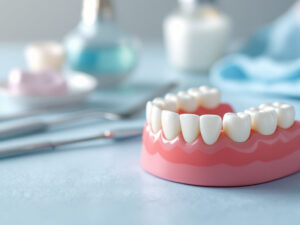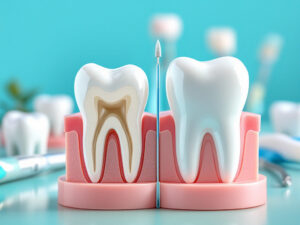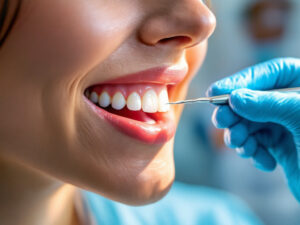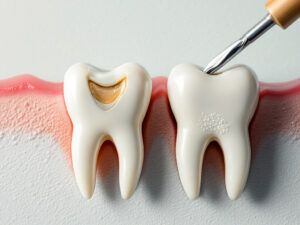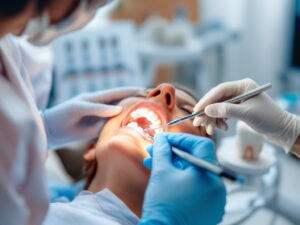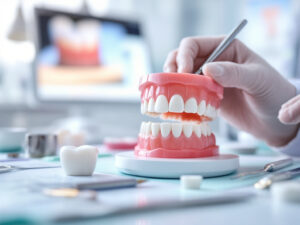Your dental crown has fallen out, and you are left wondering what to do next. Losing a crown can be unsettling, but there are effective ways to handle what many call a “lost crown repair” scenario. Whether you are dealing with unexpected pain, sensitivity, or a simple inconvenience, timely solutions can protect your oral health and restore your peace of mind. This informational guide will walk you through everything you need to know about crowns, why they fall out, and how you can get them fixed with as little stress as possible. You will also discover how Cloninger Dentistry can help you or a loved one with comprehensive family dental care, preventative hygiene, and cosmetic dentistry services that place your comfort at the forefront.
Lost crown repair basics
A dental crown is essentially a cap that covers a weakened or damaged tooth. It is frequently made from ceramic, porcelain, metal alloys, or a combination of materials. Crowns are used to restore a tooth’s shape, size, and functionality, maintaining a natural look and feel. Unfortunately, crowns can become dislodged for various reasons, sometimes at the most inopportune moments.
When a crown falls out, the newly exposed tooth surface is prone to discomfort and sensitivity. You may also find yourself worrying about further tooth damage or the costs and logistics of replacing the crown. However, a lost crown does not mean you are out of options. With proper guidance and immediate action, it is possible to salvage the existing crown in some situations or replace it in others. According to Healthline, retrieving the dislodged crown and bringing it to your dentist is crucial because there is a chance it can be reused if it remains intact.
Why crowns matter so much
Crowns act as protective shields for teeth that have been compromised by decay, fractures, or large fillings. They reinforce a tooth’s structure so you can eat and speak normally without ongoing pain or risk of breakage. When a crown falls out, the affected tooth is no longer protected, which can lead to rapid deterioration. That is why promptly handling lost crown repair is so important for your oral health.
Common scenarios
- The crown (or cap) simply loosens over time
- The cement wearing off
- There is tooth sensitivity or pain upon losing the crown
- You see visible decay around where the crown was placed
- You notice the tooth is cracked beyond the crown margin
If any of these scenarios occur, do not panic. Numerous options are available for repairs, replacements, and preventative strategies to safeguard your teeth from future issues.
Causes behind crown loss
A lost dental crown can happen for multiple reasons, some of which are more common than others. Understanding why crowns fail can help you take proactive steps to avoid the problem altogether. Here are the primary causes according to research from Healthline and Innovo Dental and Implant Studio:
- Tooth decay under the crown: Bacteria can seep under the edges where the crown meets the tooth. If decay sets in, the crown may no longer fit properly and gradually loosen or fall off.
- Insufficient tooth structure: Crowns depend on the tooth beneath for support. When there is not enough tooth left, the crown may not bond securely.
- Worn or weakened cement: The adhesive holding the crown in place can wear down over time, especially if you consume sticky foods or chew extensively on one side.
- Trauma: Physical impacts, such as sports injuries, falls, or biting into hard objects, can dislodge even a well-placed crown.
- Clenching or grinding (bruxism): Excessive biting pressure can chip or loosen dental restorations.
Once the crown is out, you will want to keep it in a safe, clean container. Avoid handling it without first washing your hands, as germs and dirt could cause additional bacterial contamination. If possible, gently clean the inside of the crown with toothpaste to remove any debris.
Temporary steps to take
Losing a crown is not usually a life-threatening emergency, but prompt care can minimize discomfort and reduce the risk of further damage. Before you see your dentist, consider a few temporary measures that could make a big difference in preserving your tooth and your crown.
-
Assess for pain or sensitivity
If the exposed tooth is sensitive or painful, over-the-counter pain medication can be used for temporary relief. According to Bedford Dental Group, you should avoid chewing on the side of the lost crown because the exposed tooth can become easily irritated. -
Return the crown to its place if possible
Some dentists, including those referenced in Healthline, suggest that gently cleaning the inside of the crown with toothpaste and using a temporary dental adhesive can help hold it in position. This is a short-term fix to protect the underlying tooth structure. Make sure to verify with your dentist whether this step is advisable for your specific situation. -
Use dental wax if needed
If the tooth has sharp or jagged edges that irritate your tongue or cheeks, apply a small amount of dental wax (available at most drugstores) over the area. Dental wax can help prevent cuts and discomfort until you can schedule an appointment. -
Avoid certain foods
As emphasized by Bloom Dental of Arlington and Bedford Dental Group, extremely hard, chewy, sticky, or overly hot or cold foods can aggravate the exposed tooth. Steering clear of these items until you see your dentist is a wise move. -
Contact your dental office
Most importantly, do not wait too long to call your dentist. Even if you do not feel any pain, scheduling a prompt visit can increase the odds of saving the original crown. If your dentist can see you soon, you might be able to avoid needing a fresh crown altogether.
What your dentist will do
Upon visiting your dentist for lost crown repair, you can expect a thorough examination to assess the condition of your tooth, the crown, and the surrounding tissue. If you choose Cloninger Dentistry, rest assured that you will be treated in a supportive environment where the focus is on individualized care and the best possible outcome for your smile.
Examination and diagnostics
Your dentist will look for signs of decay, cracks, or damage to both the tooth and the crown. Often, digital imaging services like digital xray imaging or 3d imaging dental diagnostics can help paint a clearer picture of what is going on under the crown.
Possible repair or reuse
If your crown is largely intact and the tooth underneath remains stable, your dentist may attempt to clean and re-cement it. However, if you have underlying decay, it is often necessary to treat the tooth by removing the decayed material before putting the crown back. In some cases, a root canal therapy might be required if there is an infection or substantial nerve involvement.
Replacement when necessary
Sometimes, a replacement crown is the only solution. According to Bunker Hill Dentistry, an entirely new crown is recommended if the existing one is too damaged or does not fit securely anymore. Replacements typically require taking impressions of your tooth so that a personalized crown can be created to restore proper shape and function. Material options often include porcelain, metal, ceramic, or porcelain fused to metal.
Additional treatments
- Addressing decay: Decay under the crown must be removed and filled, which may alter the shape of the tooth. This can result in the need for a new crown.
- Improving the foundation: In some instances, your dentist might recommend a procedure to build up the underlying tooth structure before recementing or placing the new crown.
- Preventive measures: If bruxism is an issue, a custom night guard might be introduced to protect the restoration from excessive wear.
Why choose Cloninger Dentistry
With so many dental practices out there, you may wonder why Cloninger Dentistry stands out. We are committed to providing the support necessary for lasting oral health, offering you and your loved ones a comprehensive range of services that cater to family dental care, preventative hygiene, and cosmetic dentistry.
-
Comprehensive care under one roof
You can address multiple oral health needs in a single location. Besides lost crown repair, we also offer services like professional teeth cleaning, fluoride treatment, pediatric dental care, and dental infection treatment. We incorporate advanced diagnostics to spot potential issues before they escalate. -
Tailored dental solutions
Our friendly, empathetic team offers individualized treatment plans (akin to a “tailored program” for your teeth) because we recognize that every mouth is different. From routine checkups to specialized procedures, we focus on efficient and comfortable experiences that enhance long-term outcomes. -
Industry-leading expertise
Our experienced dentists and staff stay updated on the newest techniques and materials for crown repairs and replacements. This ongoing commitment to training and research ensures that you receive top-notch care, whether you need a straightforward recementing or a fully customized, brand-new crown. -
Flexible financing and insurance-friendly dental practice
Crowns can be costly. According to GoodRx, a single crown can cost anywhere from $800 to $2,500 without insurance. We believe finances should not become a barrier to your oral health. Our insurance friendly dental practice and flexible financing dental solutions keep your treatments accessible and within your budget. -
Safe, supportive environment
Dental visits sometimes make people anxious, especially if you are already dealing with an unexpected issue like a lost crown. Our team fosters a reassuring atmosphere designed to help you stay calm and confident throughout your visit. We prioritize comfort so that you can focus on healing and restoration.
Prevent further crown issues
After your lost crown has been resolved, it is wise to implement strategies that guard against future problems. Many measures overlap with everyday dental hygiene, but there are also specific habits that can extend the life of your crown.
- Maintain excellent oral hygiene
- Brush twice a day with a soft-bristled toothbrush and fluoride toothpaste.
- Floss daily to remove plaque from around the crown’s margins.
- Consider adding an antibacterial mouthwash to your routine.
- Schedule routine checkups like a routine dental checkup to catch potential concerns early.
-
Go easy on sticky and hard foods
While crowns are built to be strong, excessively chewy or crunchy items can stress your restoration. Limiting these foods and chewing gum more carefully can help preserve the integrity of the crown. -
Address teeth grinding
Bruxism puts extra strain on crowns. If you clench or grind, wearing a night guard can significantly reduce that pressure. Ask your dentist for a custom-fit guard designed to protect both your natural teeth and any crowns. -
Be proactive with preventive care
Regular appointments for oral cancer screening, periodontal maintenance cleaning, or tooth sensitivity treatment can alert your dental team to early warning signs of crown looseness. They can then handle concerns well before the crown falls off. -
Stay informed about emerging materials
Advancements in dental materials might yield stronger, more efficient, or more aesthetically pleasing crowns. If your old crown fails, talk with your dentist about updated options, such as porcelain fused to zirconia or full ceramic crowns known for their durability and appearance.
Frequently asked questions
Below are some of the most common questions people have about lost crown repair. This FAQ section can help guide you before, during, and after your dental appointment.
-
Is losing a crown considered a dental emergency?
While it may not be an immediate medical emergency, losing a crown can expose the tooth to possible decay or damage. According to Bloom Dental of Arlington, you should contact your dentist as soon as possible to minimize complications. If you experience significant pain, consider it an urgent matter and let your dental practice know so they can prioritize your visit. -
How much does a crown replacement cost?
The cost can vary widely based on where you live, the materials used, and whether you have insurance coverage. Some estimates from GoodRx suggest prices ranging from $800 to $2,500 for a single crown without insurance. Many insurance plans cover around 50% of medically necessary crowns, though you should verify with your provider. Cloninger Dentistry offers transparent dental pricing and helps you align your care with available insurance benefits. -
Can my old crown be reused?
If your lost crown is in good condition and there has been no major damage to the tooth underneath, your dentist may be able to re-cement it. They will examine the crown and evaluate whether the edges still fit the tooth properly. According to multiple sources like Bloom Dental of Arlington and Healthline, many times an existing crown can still be utilized, but decay or structural changes might make a new crown necessary. -
What if there is no tooth left to support a crown?
In some extreme cases, decay or trauma can leave very little healthy tooth structure. If that is the case, your dentist might discuss other solutions, such as a core buildup, root canal therapy, or even a dental implant if the tooth cannot be saved. Techniques like tooth extraction service followed by an implant-supported crown might be considered to restore function and appearance. -
How long does a crown typically last?
According to Cottleville Smiles, a repaired or newly placed crown can last a decade or more, sometimes exceeding 15 years, depending on factors such as oral hygiene habits, the use of protective devices like night guards, and the materials used. Staying consistent with professional teeth cleaning and regular dental checkups can help maximize the lifespan of your crown.
Concluding thoughts
A lost crown does not have to derail your life or compromise your oral health. By acting promptly, you preserve your options for reusing the existing crown or getting an affordable replacement. Understanding the root causes, implementing practical temporary measures, and working closely with a trusted dental provider can make all the difference.
At Cloninger Dentistry, we do more than fix crowns. We provide a complete framework to keep your entire family’s teeth strong and healthy, offering services ranging from broken tooth repair to porcelain crown service, and from emergency dental care to routine cleanings. Our mission is to design treatment plans that address your immediate concerns while also promoting long-term prevention, ensuring you have the support necessary for lasting oral well-being.
If you or a loved one experiences a lost crown or wants to explore comprehensive family and cosmetic dental care, consider reaching out to Cloninger Dentistry. With our empathetic yet authoritative approach, we prioritize your comfort, budget, and the longevity of each dental restoration. Schedule a private dental consultation to learn more about our personalized treatment options. By taking charge of your dental health today, you pave the way for a reliable, confident smile tomorrow.


